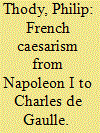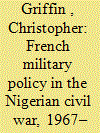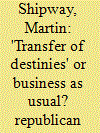| Srl | Item |
| 1 |
ID:
044125


|
|
|
|
|
| Publication |
New York, Van Nostrand Reinhold Company, 1969.
|
| Description |
159p. bib.Pbk
|
|
|
|
|
|
|
|
|
|
|
|
Copies: C:1/I:0,R:0,Q:0
Circulation
| Accession# | Call# | Current Location | Status | Policy | Location |
| 003595 | 940.55/SCH 003595 | Main | On Shelf | General | |
|
|
|
|
| 2 |
ID:
032592


|
|
|
|
|
| Publication |
London, macmillan Press, 1989.
|
| Description |
viii, 231p.Hbk
|
| Standard Number |
0333432304
|
|
|
|
|
|
|
|
|
|
|
|
Copies: C:1/I:0,R:0,Q:0
Circulation
| Accession# | Call# | Current Location | Status | Policy | Location |
| 031618 | 944.05/THO 031618 | Main | On Shelf | General | |
|
|
|
|
| 3 |
ID:
139100


|
|
|
|
|
| Summary/Abstract |
During the Nigerian Civil War (1967–1970), France chose to support Biafra, but only on a limited scale, providing mercenaries and obsolete weaponry to Ojukwu's regime. General Charles de Gaulle's assistance to Ojukwu was conditioned by the French military drawdown after 1961, the increased power of French secret services on the continent, and the interventions in Katanga (1960–1963), Gabon (1964) and Chad (1968–1972). France supported Biafra primarily to protect its former colonies from Nigeria, stop Soviet subversion and acquire an economic foothold in the oil-rich Niger Delta. De Gaulle chose a limited strategy for two reasons. If Biafra won the war, France would be Biafra's greatest ally. If Nigeria won the war, France could extricate itself from the situation relatively easily and re-establish relations with the Nigerian government, which is what ultimately occurred.
|
|
|
|
|
|
|
|
|
|
|
|
|
|
|
|
| 4 |
ID:
094158


|
|
|
| 5 |
ID:
084259


|
|
|
|
|
| Publication |
2008.
|
| Summary/Abstract |
Details of independence ceremonies in French sub-Saharan Africa in 1960 are sparse. Republican France had no place for monarchist pageantry and ornamentalism, although there was some borrowing from the British rhetoric and iconography of the end of Empire. This article explores differences between French and British decolonization with particular attention to the French experience in Vietnam and the French West and Equatorial Africa 1958-60.
|
|
|
|
|
|
|
|
|
|
|
|
|
|
|
|
| 6 |
ID:
129553


|
|
|
|
|
| Publication |
2014.
|
| Summary/Abstract |
Charles de Gaulle's visit to Quebec in 1967 continues to attract significant scholarly and popular attention. Despite ongoing efforts to broaden our understanding of the evolution of France-Quebec relations during the 1960s, de Gaulle's visit remains the pivotal event of that rapprochement and is believed to confirm the French president's personal support for Quebec's independence, stemming from his efforts to position post-colonial France as the champion of decolonization and self-determination for dependent peoples. This scholarly consensus, however, can be challenged by even a cursory glance at France's policies toward New Caledonia in the 1960s, which reflected a fierce French determination to prevent the loss of its Pacific Ocean territory. Instead of accepting, much less encouraging, New Caledonia's autonomy, the French state in fact re-colonized New Caledonia over the course of the 1960s, a situation that compels us to examine more closely the attitude of de Gaulle and the French state toward "decolonization" in Quebec during the same period. The national aspirations that mattered most to France or to de Gaulle were those of France itself.
|
|
|
|
|
|
|
|
|
|
|
|
|
|
|
|